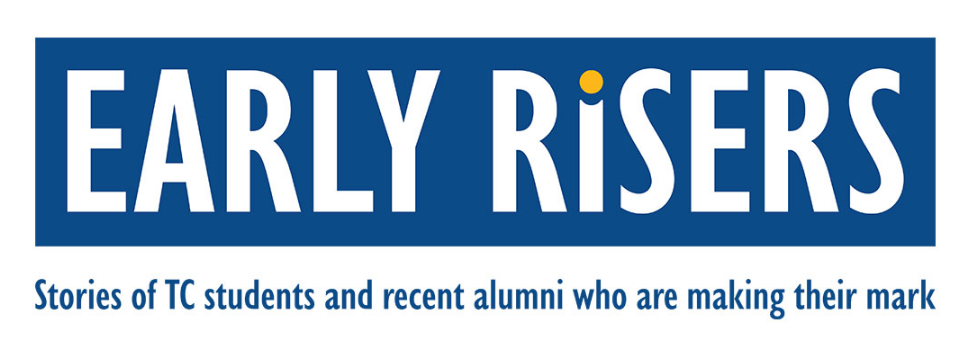If your health education classes in school were defined by awkward conversations, outdated science, and silence on issues related to the LGBTQ+ community and different cultures, Reva McPollom (M.A. ’12) relates to what you went through. As the founder and CEO of Lessonbee — an online learning platform that offers culturally relevant health education courses — she’s rewriting the rules to break new ground in how schools teach sex education, mental health and more.
“I like developing the technology, and I like solving really big problems, and I wanted to figure out how I could apply that to a more meaningful context,” says McPollom, an alumna from the College’s Instructional Technology and Media program. After leveraging her passions into a career in education technology, McPollom began Lessonbee in 2016 after identifying health education as one of the biggest challenges for educators within her network.
“[It] stood out to me because when I was a kid, I struggled to feel healthy in and out of school. I struggled with trying to figure out my sexuality; I struggled with my mental health and anxiety.” In McPollom’s view, traditional health ed courses often ignore the identities and challenges that students bring into a health education classroom. That, plus discrepancies in how different states approach teaching health topics, she says, hinder the efficacy of curriculums on sex ed, mental health, substance abuse and more.
“Kids are not being met where they’re at, and that was kind of the lightning moment for me,” says McPollom. “This is a huge opportunity for both income and for impact, to solve this long-standing challenge and to make the world a better place, where people are actually investing in building health knowledge skills for themselves, their families, their communities, etc.”

Lessonbee’s curriculum covers physical health, mental health, sex education and more. (Illustration courtesy of Lessonbee)
To create the dozens of courses designed for K-12 students and adult audiences, McPollom and her team conducted extensive research and developed various personas as stand-ins for users with the purpose of developing “realistic and relatable” online modules, an ideal format “for health education probably above all other topics because health is so personal and nuanced” and how often schools lack the resources for designated health educators.
To further help all students feel engaged by the curriculum, the Lessonbee team integrated culturally-inclusive details — like specific references, locations, cuisines and terms — that serve as “anchors” for students that “reflect back their context.”
“You have to understand what it means to be a culturally responsive educator, and fundamentally, it’s about building trust in the classroom,” says McPollom. “It’s about building trust by validating students’ experiences, by incorporating what’s relevant to them and resonante to them by understanding who they are and where they come from.”
This core focus — to create a health education curriculum that is as inclusive as possible — is an innovative approach, but McPollom says she began the journey during her studies at Teachers College.
“What TC enabled me to do was to create digital learning experiences for all types of students — regardless of where they come from or what their level of education is, and that is what has made it possible for us to create these resources that are truly culturally responsive and adaptive,” says McPollom, noting that her TC education “plays an enormous role” in her daily work. “You really have to understand how to conduct analysis...All of that is the stuff that I learned at TC that a lot of times, people don’t have when they’re developing training programs, or when they’re trying to create materials to reach kids and teens.”
Right now, Lessonbee’s online format carries a new level of significance. As the world shifts yet again amid COVID-19 vaccinations, having accessible mental health education “that helps [students] develop socially and emotionally” is more critical than ever, McPollom says.
The data supports McPollom’s concerns, with the CDC reporting a 31% jump in emergency room visits among teens for issues like panic attacks during the pandemic, and a recent study from TC’s John Allegrante finding that COVID-19 had a significant, detrimental impact on teens, especially girls.
“Everything that we’re doing is about developing kids and teens so they can manage and nurture their health on their own, and it's important to activate the power of kids and teens so they’re able to do that — not just rely on the adults around them,” McPollom says.
This ethos of focusing on “how kids feel” — which, in McPollom’s view, distinguishes her start-up from other technologies — has helped Lessonbee gain traction and, by this fall, play a role in more than 3,000 schools. But the education tech program notably helped receive its start from fellow TC alumnus Cameron Fadjo (M.A. ’07, M.Ed. ’09, Ph.D. ’12), who first implemented the program through his leadership at Pleasantville Schools in New York. Fadjo, who now serves as the Assistant Superintendent for Instructional Services for the district, was “one of the strongest advocates and supporters of Lessonbee” from the very beginning, says McPollom.
“When you’re a start-up, getting that first district to sign on and give you a shot is very significant,” says McPollom, whose innovative leadership landed her on The Root’s 2020 list of “The Most Influential List of African Americans.” “It’s about meeting the kids where they’re at; it’s making sure they all get access to the same level of information and in a way that they’re going to feel safe.”
— Morgan Gilbard

